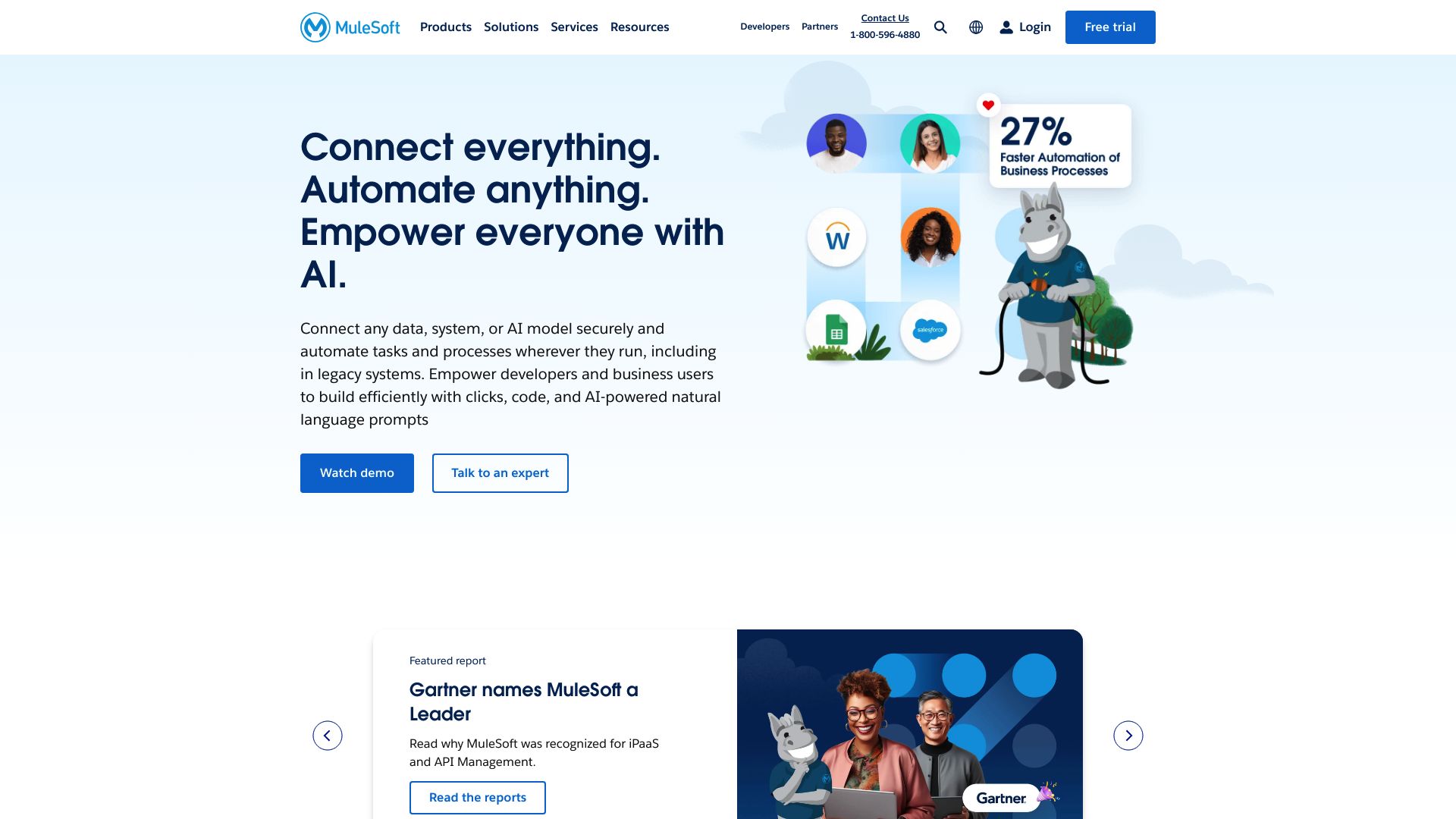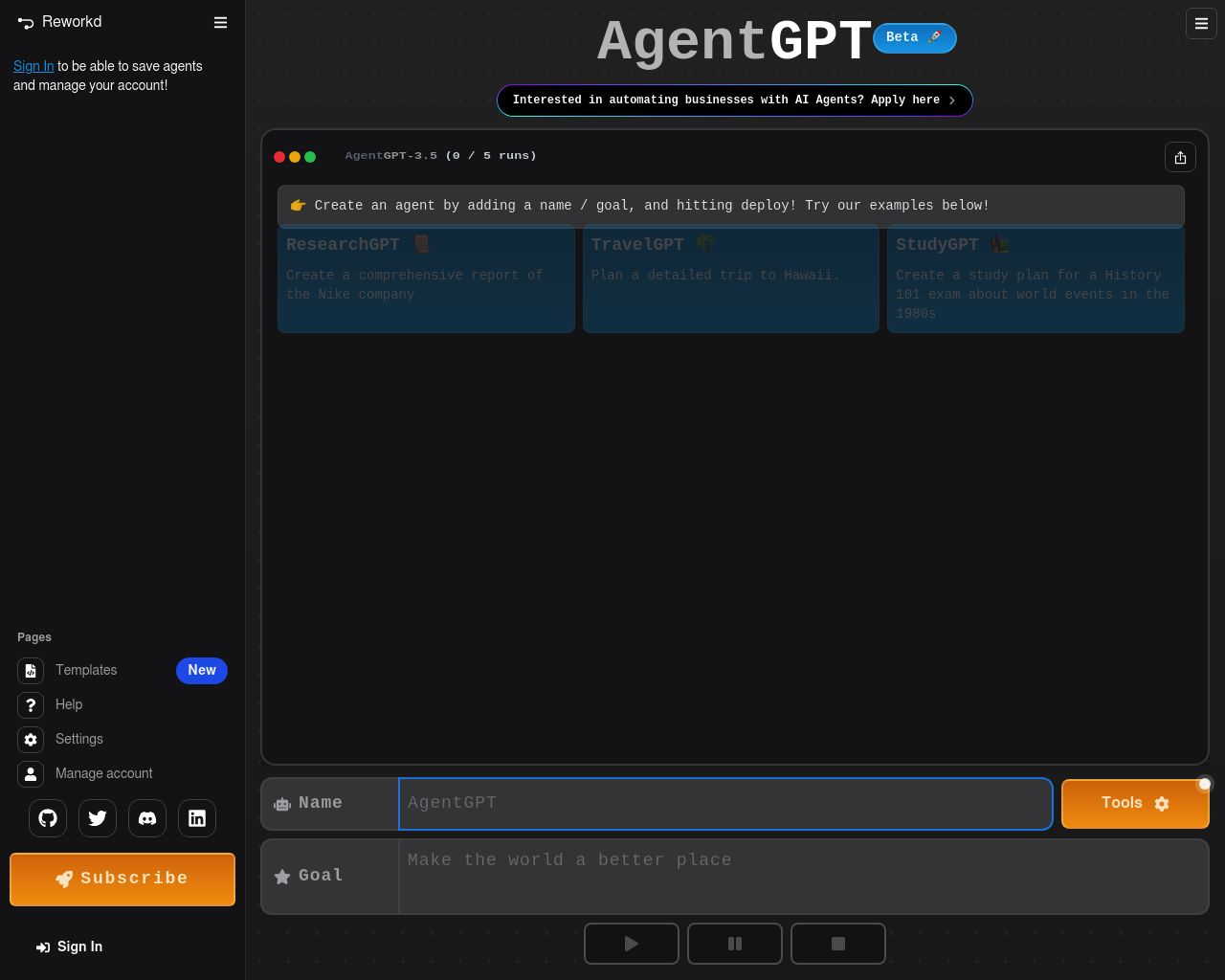Mulesoft vs. AgentGPT: Comparing AI Development Platforms
AI agent development platforms revolutionize how businesses create, deploy, and manage intelligent solutions. This comparison explores Mulesoft vs. AgentGPT, and SmythOS, three leading platforms shaping the AI landscape. Mulesoft’s enterprise-grade integration capabilities, AgentGPT’s user-friendly autonomous agent creation, and SmythOS’s comprehensive AI development ecosystem each offer unique advantages.
We’ll examine their features, use cases, and target audiences to help you choose the ideal platform for your AI development needs. Whether you’re a seasoned developer, a business leader, or an AI enthusiast, this guide provides valuable insights into the strengths and limitations of these powerful tools.
Mulesoft Overview
Mulesoft powers digital transformation with its comprehensive integration platform. The Anypoint Platform enables organizations to design, build, and manage APIs, connecting data across systems and applications seamlessly.


Mulesoft’s core offering, the Anypoint Platform, provides full API lifecycle management. Developers use Anypoint Studio, a visual development environment, to create and deploy APIs efficiently. For less technical users, Flow Builder offers a no-code solution for building integrations.
The Anypoint Platform enables organizations to design, build, and manage APIs, connecting data across systems and applications seamlessly.
The platform excels in enterprise-grade features. Robust security measures, including OAuth support and IP whitelisting, protect sensitive data. Scalability options cater to growing businesses, while detailed logging and monitoring tools ensure operational visibility.
Mulesoft integrates AI capabilities throughout its ecosystem. The platform connects with various AI models, including OpenAI and custom solutions. This AI integration enhances problem-solving capabilities, enables chatbot development, and supports automated workflows.
While Mulesoft offers powerful tools, its enterprise focus may present a learning curve for smaller teams or individual developers. The platform’s extensive features can require significant time investment to master fully. Additionally, pricing information is not readily available, potentially making cost assessment challenging for some organizations.
AgentGPT Overview
AgentGPT empowers users to create and deploy customizable AI agents in a web environment. Unlike conventional chatbots, AgentGPT focuses on achieving broad, goal-oriented tasks through autonomous agents. The platform’s web-based interface distinguishes it from locally-operated alternatives, offering accessibility and ease of use.


AgentGPT boasts a robust feature set, including user authentication, agent run saving and sharing, dynamic translations, and AI model customization. The platform’s integration of vector databases for memory management enhances agent functionality, allowing for retention of execution history and long-term memory access. This capability proves particularly valuable for complex, extended operations.
AgentGPT boasts a robust feature set, including user authentication, agent run saving and sharing, dynamic translations, and AI model customization.
Developers benefit from AgentGPT’s flexibility, with options to run locally using docker-compose without an API key or leverage its scalable cloud offering. The platform’s seamless integration with tools like LangChain further expands its utility. For businesses, AgentGPT streamlines web data extraction, automating the entire pipeline from website scanning to data output, potentially reducing costs and operational hassles.
While AgentGPT offers impressive capabilities, users should consider potential limitations. The platform’s web-based nature may present challenges for users requiring extensive offline functionality. Additionally, as with many AI platforms, the quality of results heavily depends on the input and training data provided, which may require careful curation and management.
AgentGPT’s vision centers on democratizing AI technology, making advanced tools accessible to a broader audience. This approach aligns with the growing trend of AI democratization in the industry. However, users should weigh the platform’s capabilities against their specific needs, particularly in areas like data privacy, customization depth, and integration with existing systems.
Feature Comparison
Mulesoft and AgentGPT offer distinct approaches to AI agent development and deployment. Mulesoft excels in enterprise-grade integration and API management, while AgentGPT focuses on accessible, web-based autonomous agent creation.
Mulesoft’s Anypoint Platform provides robust API lifecycle management and integration capabilities. It offers visual development tools like Anypoint Studio and Flow Builder, enabling both code-based and no-code approaches. Mulesoft’s strength lies in its extensive integration ecosystem, supporting connections to various data sources, APIs, and AI models. The platform ensures enterprise-level security with features like OAuth support, IP whitelisting, and detailed logging.
AgentGPT, in contrast, emphasizes user-friendly, web-based AI agent creation. It offers a more streamlined approach to building autonomous agents capable of completing goal-oriented tasks. AgentGPT’s web interface makes it accessible to users without extensive coding knowledge. While it may lack some of Mulesoft’s enterprise-grade features, AgentGPT’s focus on autonomous agent development and deployment through a web environment offers unique advantages for rapid prototyping and experimentation.
Key feature gaps emerge in core components and security. Mulesoft provides more comprehensive API management tools and enterprise-grade security measures. AgentGPT, while offering robust AI agent creation capabilities, may not match Mulesoft’s depth in areas like data encryption, OAuth implementation, or extensive API lifecycle management. However, AgentGPT’s web-based approach and focus on autonomous agents provide distinct advantages for users seeking quick deployment of AI-driven solutions without the complexities of enterprise-level integrations.
Feature Comparison Table
| Mulesoft | AgentGPT | SmythOS | |
|---|---|---|---|
| CORE FEATURES | |||
| Visual Builder | ✅ | ❌ | ✅ |
| No-Code Options | ✅ | ❌ | ✅ |
| Memory & Context | ❌ | ✅ | ✅ |
| Explainability & Transparency | ❌ | ❌ | ✅ |
| Problem-Solving Capabilities | ❌ | ✅ | ✅ |
| Human-AI Interaction | ❌ | ❌ | ✅ |
| Audit Logs for Analytics | ❌ | ✅ | ✅ |
| SECURITY | |||
| Constrained Alignment | ✅ | ❌ | ✅ |
| Data Encryption | ❌ | ✅ | ✅ |
| IP Control | ✅ | ❌ | ✅ |
| COMPONENTS | |||
| Foundation AIs | ✅ | ❌ | ✅ |
| Huggingface AIs | ❌ | ✅ | ✅ |
| Zapier APIs | ❌ | ✅ | ✅ |
| All other APIs, RPA | ❌ | ✅ | ✅ |
| Logic | ❌ | ✅ | ✅ |
| Data Lakes | ✅ | ❌ | ✅ |
| DEPLOYMENT OPTIONS (EMBODIMENTS) | |||
| Staging Domains | ✅ | ❌ | ✅ |
| Production Domains | ✅ | ❌ | ✅ |
| Deploy as Scheduled Agent | ❌ | ❌ | ✅ |
| Scalability | ❌ | ✅ | ✅ |
| DATA LAKE SUPPORT | |||
| Sitemap Crawler | ❌ | ❌ | ✅ |
| YouTube Transcript Crawler | ❌ | ❌ | ✅ |
| URL Crawler | ❌ | ✅ | ✅ |
| PDF Support | ❌ | ✅ | ✅ |
Best Alternative to Mulesoft and AgentGPT
SmythOS emerges as the superior alternative to Mulesoft and AgentGPT, offering a comprehensive platform for AI agent development and deployment. We combine the best of both worlds: enterprise-grade capabilities and user-friendly design.
Our visual builder and no-code options make AI agent creation accessible to users of all skill levels. Unlike Mulesoft’s complex enterprise integration focus or AgentGPT’s limited web-based approach, SmythOS provides a versatile environment for building sophisticated AI agents without sacrificing ease of use.
SmythOS provides a versatile environment for building sophisticated AI agents without sacrificing ease of use.
SmythOS excels in memory and context management, a critical feature lacking in Mulesoft. This enables our AI agents to maintain coherent, context-aware interactions across multiple sessions. We also prioritize explainability and transparency, addressing a gap in both Mulesoft and AgentGPT. Users can easily understand and trace AI decision-making processes, fostering trust and compliance.
Our platform supports a wide range of deployment options, from APIs and webhooks to scheduled agents and chatbots. This flexibility surpasses both Mulesoft and AgentGPT, allowing users to integrate AI agents seamlessly into existing workflows and systems. SmythOS also offers robust scalability, ensuring that your AI solutions can grow with your business needs.
SmythOS also offers robust scalability, ensuring that your AI solutions can grow with your business needs.
With SmythOS, users gain access to an unparalleled feature set, including multi-agent collaboration, human-AI interaction tools, and advanced data processing capabilities. Our platform supports various AI models, APIs, and data sources, providing a truly comprehensive solution for AI agent development and deployment. By choosing SmythOS, users can leverage the power of AI to drive innovation and efficiency across their organizations, surpassing the limitations of both Mulesoft and AgentGPT.
Conclusion
Mulesoft and AgentGPT offer powerful solutions for integration and AI agent development, each with unique strengths. Mulesoft excels in enterprise-grade API management and integration, providing robust tools for large-scale operations. AgentGPT shines in its accessibility and focus on autonomous AI agents, making advanced AI capabilities more approachable.
However, SmythOS emerges as the superior choice, combining the best of both worlds. Our platform offers unparalleled flexibility, ease of use, and comprehensive features that cater to a wide range of users, from developers to business leaders. SmythOS’s drag-and-drop interface, extensive integration ecosystem, and support for multiple AI models empower users to create sophisticated AI workflows without extensive coding knowledge.
Unlike Mulesoft’s steep learning curve and AgentGPT’s web-based limitations, SmythOS provides a balanced approach. We offer enterprise-grade security and scalability while maintaining user-friendly tools for rapid prototyping and deployment. Our platform’s ability to deploy AI agents across various environments, from APIs to chatbots, surpasses the capabilities of both Mulesoft and AgentGPT.
To experience the future of AI agent development and deployment, explore our diverse range of AI-powered agent templates. These templates cover multiple business categories, streamlining processes across various functions. Ready to transform your workflow? Create a free SmythOS account and start building AI agents with no time limit. Unleash the power of AI for your business and join the SmythOS revolution today.
Last updated:
Disclaimer: The information presented in this article is for general informational purposes only and is provided as is. While we strive to keep the content up-to-date and accurate, we make no representations or warranties of any kind, express or implied, about the completeness, accuracy, reliability, suitability, or availability of the information contained in this article.
Any reliance you place on such information is strictly at your own risk. We reserve the right to make additions, deletions, or modifications to the contents of this article at any time without prior notice.
In no event will we be liable for any loss or damage including without limitation, indirect or consequential loss or damage, or any loss or damage whatsoever arising from loss of data, profits, or any other loss not specified herein arising out of, or in connection with, the use of this article.
Despite our best efforts, this article may contain oversights, errors, or omissions. If you notice any inaccuracies or have concerns about the content, please report them through our content feedback form. Your input helps us maintain the quality and reliability of our information.
